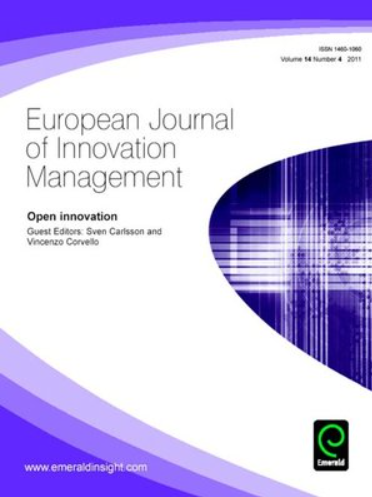创业个性与创业创新的相互作用——技术采用的中介效应
IF 5.7
3区 管理学
Q1 BUSINESS
引用次数: 0
摘要
目的在不断发展的数字环境中,本研究旨在探索哪些特定的个性特征有助于创业公司的创新性,特别强调了解技术采用如何调节这种关系。通过这样做,作者们努力揭示数字时代个性、技术采用和创业创新的微妙动态。设计/方法论/方法作者对1314家德国初创企业进行了定量实证分析。本研究采用中介分析法考察了人格特征对创业公司创新能力的影响,并将技术采用作为中介。实证结果表明,某些人格特征对创新能力有直接影响。此外,研究结果表明,技术采用是创业创新的驱动因素。此外,这些特征(部分)是由技术采用介导的。研究局限性/含义研究结果揭示了企业家的个性和技术采用与创业创新的相互作用,因此强调了技术在这一三角关系中的重要性。作者使用了来自德国初创公司的二次数据,这使将结果推广到其他地理和文化背景变得复杂。创新性/价值本研究通过提供技术采用在人格特征与创业创新性关系中的中介作用的实证证据,为人格特征在创业中的作用的科学辩论做出了贡献。这些发现为有兴趣理解和促进初创企业创新的研究人员、企业家和政策制定者提供了宝贵的见解。本文章由计算机程序翻译,如有差异,请以英文原文为准。
The interplay of entrepreneurial personality and startup innovativeness – the mediation effect of technology adoption
PurposeIn the ever-evolving digital landscape, this study aims to explore which specific personality traits contribute to the innovativeness of startups, with a particular emphasis on understanding how technology adoption mediates this relationship. By doing so, the authors strive to unveil the nuanced dynamics of personality, technology adoption and startup innovativeness in the digital era.Design/methodology/approachThe authors conduct a quantitative empirical analysis using a sample of 1,314 German startups. This study utilizes a mediation analysis to examine the effects of personality traits on the innovativeness of startups, taking technology adoption as a mediator into account.FindingsThe empirical results show certain personality traits have direct effects on innovativeness. Also, the results show that technology adoption is a driver of startup innovativeness. In addition, these traits are (partially) mediated by technology adoption.Research limitations/implicationsThe results shed new light on the interplay of entrepreneurs' personality and technology adoption in relation to startup innovativeness and therefore underline the importance of technology in this triangular relationship. The authors employ secondary data from startups in Germany, which complicates generalization of the results to other geographical and cultural contexts.Originality/valueThis study contributes to the scientific debate on the role of personality traits in entrepreneurship by providing empirical evidence on the mediating effect of technology adoption in the relationship between personality traits and startup innovativeness. The findings offer valuable insights for researchers, entrepreneurs and policymakers interested in understanding and promoting innovativeness in the context of startups.
求助全文
通过发布文献求助,成功后即可免费获取论文全文。
去求助
来源期刊
CiteScore
10.40
自引率
17.60%
发文量
107
期刊介绍:
The subject of innovation is receiving increased interest both from companies because of their increased awareness of the impact of innovation in determining market success and also from the research community. Academics are increasingly beginning to place innovation as a priority area in their research agenda. This impetus has been partly fuelled by the Economic & Social Research Council (ESRC) who have designated innovation as one of nine research areas in their research initiative schemes.

 求助内容:
求助内容: 应助结果提醒方式:
应助结果提醒方式:


